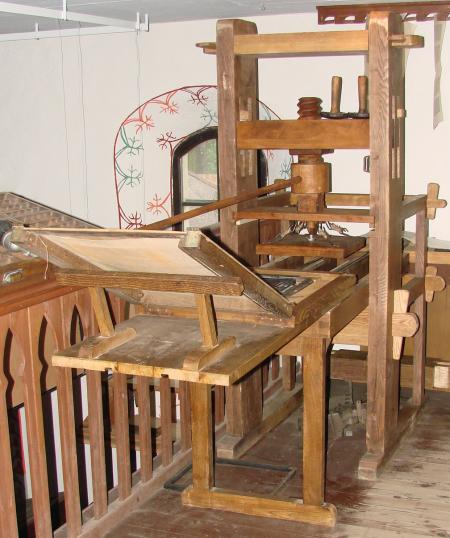 |
| "The press descending from the heavens" |
Okay, so I know this idea is pretty funny, the printing press coming down out of the clouds bathed in light. But, really, we as Latter-day Saints do believe that developments in science are divinely commissioned. As the prophet Brigham Young said, "Every art and science known and studied by the children of men is comprised within the Gospel. Where did the knowledge come from which has enabled man to accomplish such great achievements in science and mechanism within the last few years? ...[From the Supreme Being] has every art and science proceeded" (see
here for the teachings of President Brigham Young).
 |
| a replica of the Gutenberg printing press |
In Dane's
post, Summer's
post about her trip to the Crandall printing museum, it is easy to see how important the development of science, of the printing press, has been for the common man to be able to read the Bible, and later the Book of Mormon. I was just thinking about this as tomorrow we study about Print and Science (see
our class's blog).
 |
| Erasmus' Bible |
Although not always (maybe mostly) accurate, many editions of the Bible have been made to ensure that people can compare translations and read the word of God in their own language. Dr. Skousen pointed this out using his story in class about Erasmus' edition of the Bible based on the Spanish idea of printing in multiple languages in one codex. In order to complete it quickly, it wasn't completely accurate. If I'm remembering correctly, Erasmus was also the man to promise his government that he would mention the trinity in his version of the Bible if they could find an older manuscript that had it. After two years, they did find one, and he did put it in. This kind of story emphasizes the reasons for the many versions of the Bible.

But the printed press did not only allow for the expansion of the influence of holy scriptures. As Elizabeth Eisenstein explains in her book, "
The Printing Revolution in Early Modern Europe," "many authorities ...assign to early printers a negative, retrogressive role. 'There is no evidence that, except in religion, printing hastened the spread of new ideas ...In fact the printing of medieval scientific texts may have delayed the acceptance of ...Copernicus'" (210).
Eisenstein goes on to explain that the idea that the printing press stunted the advancement of science is both naive and incorrect. With a printing press, scientists were able to record and share in a huge way the discoveries they made from observing the "book of nature." When maps could be correctly copied over and not deteriorate in quality as they were drawn over and over again, many scientists and explorers were able to check the map's accuracy by traveling to that place and determining it for themselves.
Although during the Renaissance it became a popular idea to turn from the "little books of men" to the "great book of Nature," it was printing that enabled people to fact-check "Ptolemaic astronomy," "Galenic anatomy," and "Aristotelian physics" (209). Overall, the great favors that the invention and wide-scale use of the printing press did for religion in early modern Europe were not the only favors being done; the scientific world was, with the use of printing, able to stay on the same page and to ensure many times over that someone's assertion or observation was, or was not, accurate. The printing press has done wonders for the scientific community as well.


I don't think it's any coincidence that the scientific revolution coincided (coincided... does that mean it was a coincidence?) with the printing revolution. Dr. Burton mentioned some of the quirkier things published in the first scientific journals, but I think they really did rapidly accelerate the way people were able to make scientific discoveries and breakthroughs.
ReplyDelete